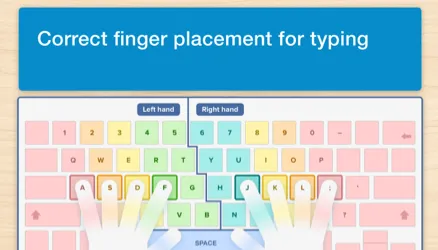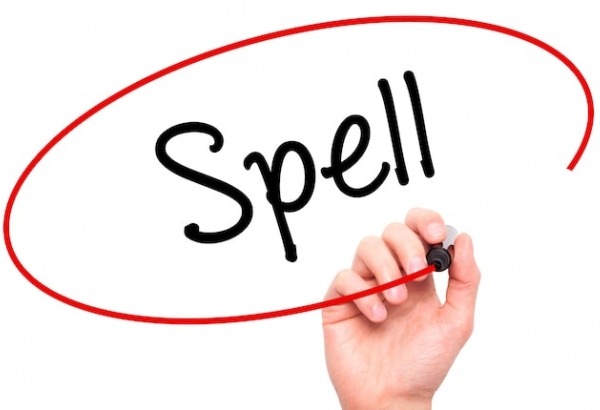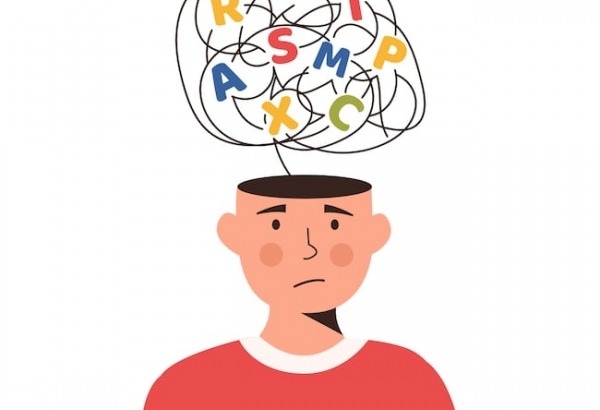3 Spelling mistakes that are easy to make

Not everyone finds spelling easy. Children and adults, native and non-native speakers, and individuals with and without learning difficulties can all struggle with the irregularity of spelling in English.
That’s because more than one letter or letter combination can be used to represent a sound. An f is used in firetruck but ph is used in phone. Similarly, the same letter(s) can represent different sounds. The pronunciation of c in face is soft but the c in car is hard. The initial sound in kick is k, but the same sound is spelled with a ck at the end of the word.
And while there are a number of rules and English spelling patterns, it isn’t always obvious how a word should be spelled if you’re hearing it for the first time. There are also many exceptions to the rules.
This is due to the way in which English evolved, and to the high number of loan words it contains. For example, bureau is a French word that contains a vowel string of three letters that stand for only one sound. Hypothesis is of Greek origin which is evident in the way it is made plural, hypotheses.
How easy is it to learn to spell?
The peculiarities of English spelling make it hard for young kids who are learning how to read and write, and mistakes are common from kindergarten through fourth, fifth, and even sixth grade. However, it’s also possible for spelling problems to persist into junior high and high school, and even adulthood.
Whether or not an individual is prone to making spelling mistakes can depend on a number of factors such as how often they read and write, any other languages they know, and the size of their spoken vocabulary in English. Additionally, some words are more commonly misspelled than others. But it is important to note that spelling difficulties are often seen when language-based learning difficulties are present.
What causes spelling problems?
Dyslexia
Dyslexia can affect how an individual breaks words down into their component sounds. Problems with short-term memory make the memorization of rules a challenge, and spelling may be inconsistent from one day to the next. Learn more about spelling strategies for individuals with dyslexia.
Dyspraxia
Motor skills difficulties, such as dyspraxia, can cause spelling problems because they make writing by hand physically painful, which distracts an individual from getting the spelling right. Dyspraxia can additionally cause problems with sequencing and letter order.
Dysgraphia
Dysgraphia is a learning difficulty that complicates writing and can make misspelled words more common.
Visual impairment and visual processing difficulties
Children and adults who struggle with visual impairment or visual processing difficulties may find spelling more challenging as they get less reinforcement from exposure to correct written forms.
English as a second, foreign or additional language
In individuals who are not native English speakers, first language interference can cause spelling errors.
For example, there’s been ample research on Arabic first language speakers who are more prone to making English spelling mistakes that have to do with missing or incorrect short vowels, also known as vowel blindness.
This is because in Arabic, short vowel sounds are not written and thus learning to write them after a lifetime of leaving them out is a very difficult process.
Depending on a person’s first language background, different kinds of spelling errors may be more common.
Learn more about writing in English and check out our strategies and tips for teaching EAL, EFL and ESL learners who are struggling with English spelling.
3 Common spelling mistakes
1. Mixing up homophones.
If you make mistakes with to (the preposition), two (the number), and too (the adverb) you are not alone. These words not only sound the same, but their spelling is similar. Nonetheless, they have different meanings and grammatical functions. The same goes for their, there, and they’re, whether and weather, and its and it’s which cause a lot of confusion.
These words are phonologically encoded in the same way. However, in writing we have to go out of our way to specify which version of the spoken word we want. Sometimes we skip this step and inadvertently put the wrong version down. This can happen in fluent bursts of writing where stopping to consciously process a word can interrupt the flow of thoughts.
As homophones are not necessarily misspelled (they’re the wrong word) and they sound the same, you are less likely to pick up on these mistakes in proofreading, unless you’re specifically looking for them.
What can you do to avoid making mistakes with homophones? As is the case with many pairs of words which look similar and are also close in meaning (affect and effect for example), sometimes we need to create a mnemonic device to help us tell the two (or three) apart.
Make sure you know how to use both words in the correct way and try learning a few sample sentences to give you examples you can reference when in doubt.
Next, it’s time to practice spelling. You can try flashcards, dictation exercises, or even a typing program like Touch-type Read and Spell – there’s a whole subject on homophones - until the words become automatized.
Automatization in spelling means you spell it without having to think about it. In touch-typing, your hands automatically follow the correct finger movement patterns to type the word.
Lastly, if you know these words are a problem, go out of your way to check every instance of them in your own writing – just to be sure you haven’t made any mistakes.
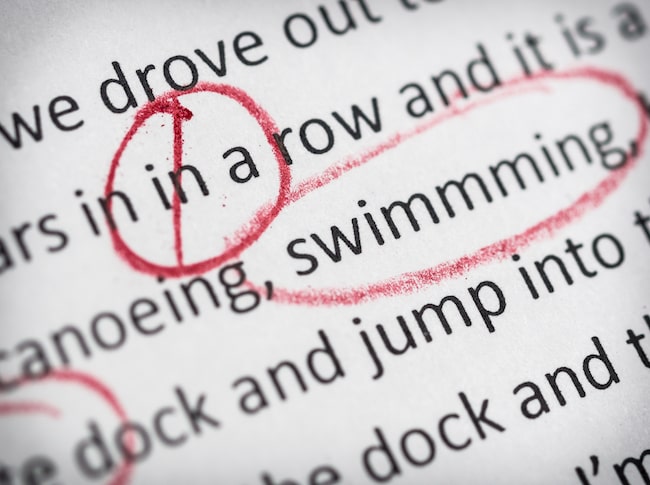
2. To double or not to double the letter.
One way in which we can change word stems in English is to add a prefix or suffix. These are the bits that come at the start or end of the word.
It may be a prefix that changes a word to the opposite meaning, such as in legal/illegal. It could also be a suffix that changes the tense of a verb from hop to hopped or swim to swimming.
It might be something more complicated too, like removing one ending and adding another, for example when happy becomes happier.
Where prefixes and suffixes are concerned, the English speller has to make some tough decisions about doubling or not doubling letters (and in the case of happy dropping letters and changing vowels too!).
Certain suffixes require you to double the consonant at the end, for example -ing and -ed, and others, like -ly, do not.
There’s also doubling that occurs when there’s a vowel before the final letter, as in the hopped example above, or the word split which becomes splitting.
But as always in English, there are exceptions. If there’s already a double letter, you leave it. If the word ends in a vowel, you don’t double. If the final consonant is preceded by two vowels, there shouldn’t be any doubling.
There are some letters that are almost always doubled, like z, and others that are never doubled, take h, w, x and y for example.
There are words like tomorrow in which you just have to learn that only one of the middle consonants is doubled. There are also words with two pairs of doubles, accommodate, and those words where a double letter changes the meaning and pronunciation, such as in desert vs. dessert.
All in all, the double letter issue has tricked a lot of good English spellers, so don’t feel bad if you’re one of them.
How can you stop making spelling mistakes related to doubled letters? It does help to learn the rules and see lists of words which do and do not have their consonants doubled. If you know you struggle with a particular word, you can try coming up with a trick to remember its spelling.
Some people think that it’s hot in the desert so you only have one s, but with dessert, it's so sweet you always want more so there are two.
If it’s a word in which you are tempted to double a letter that doesn’t need doubling, try writing it out repeatedly or typing it over and over until the one letter version becomes automatic. Unfortunately, if you’ve been misspelling it for some time you'll have to work hard to get the fossilized form to go.
3. One word or two?
There are a number of words in English that are commonly misspelled as two words, or treated as one when they should be two. This is because adding two words together to make a new one, also known as compounding, is a perfectly acceptable thing to do in English.
A common spelling mistake is to write a lot as alot and no one as noone. In the case of the latter, no one is a multi-word chunk that behaves grammatically as though it were one word, but is actually two words. This is particularly confusing given nobody and nowhere are one word.
Some people are tempted to add hyphens. While it is true that hyphens can sometimes work, it depends if you are writing in UK or US English as they have different rules concerning their usage. And for words, like no one, you can’t use a hyphen no matter where you live.
Some words can be both one and two words. A lot of people spell everyday using its modifier form "It was just an everyday shirt, nothing special," when they really mean it as an expression of frequency which requires two words "I go to school every day."
English also has a lot of phrasal verbs which have prepositions after them that function as part of the verb and can complicate the one or two-word distinction. You log in to the program but you use your login name and password to do so.
So how do you learn which words stay together and which should be kept apart? The best approach is to pull a list of confusing compound words and study them on a case by case basis. If you can come up with a story to help you remember, even better "no one wants to be packed in too tightly – people need a little space between."
Spelling and grammar checks will alert you to this type of error when you’re writing on a computer, but they have a harder time catching context driven mistakes, as both word forms are permissible. However, if you’re aware of the errors you’re likely to make, it can help you be a more effective proofreader of your own work.
Other types of errors
Leaving out silent letters
English has its fair share of silent letters. Silent -e’s abound at the end of words and it can be tempting to add them where they don’t belong, especially for young children who are just learning how to spell.
Mixing up word endings
English has a lot of similar bits that come up at the start and end of words. The -ible -able distinction is one that causes a lot of spelling mistakes.
Reversing letter order
This can happen in consonant clusters like tch or spl or when two or more vowels come together to make a sound ae vs. ea. Letter order is especially tricky for foreign loan words in which the consonant or vowel strings do not appear in many other English words.
Which words are the hardest to spell?
Every word has a different difficulty level for every person depending on a number of factors, ranging from how many words that person uses, to how commonly they encounter the word or have to produce it in writing.
Nonetheless, there are some factors which can make a word harder to spell, including the number of letters it contains, the number of syllables it contains, its general frequency in English and the transparency of its phonology.
Learn more about word-factors that affect spelling difficulty.

When does spelling matter?
Spelling ability is in no way related to intelligence, nor does it say anything about an individual’s strength as a writer. In fact, some of the most famous and celebrated English authors were notoriously bad spellers, from Jane Austin, to Hemingway, and even Agatha Christie!
But misspelled words can still lead to lower grades in education, and making mistakes is often seen as laziness attributed to poor proofreading.
More importantly, receiving a paper full of red marks can be quite demotivating and embarrassing for students. It can knock a child’s self-confidence and distract teachers from focusing on the quality of the actual composition.
Fear of making spelling errors may even impact future assignments by preventing kids from using the full extent of their vocabulary.
In adults, spelling mistakes can undermine respect and lead people to negatively judge a person’s capability as a worker. An adult who is self-conscious about his or her spelling skills may not pursue their preferred career or try for work promotions if they feel those lacking skills will be put on display.
Learn more about spelling skills for adults.
Ideas for improving spelling
- Involve all of your senses
Whereas fifty years ago writing the term repeatedly might have been your best option, today you can access an audio recording as you see the word and either write or type it out. Multi-sensory learning can make a big difference in retention as the combination of diverse sensory input helps reinforce learning to make words "stick."
- Use phonics
Words are built of phonemes which are the smallest units of sound within a word. Learning more about how English breaks down into individual sounds, and how those sounds are spelled, can give you a good grounding in English phonics and familiarize you with some of the basic spelling patterns.
- Be creative
When repetition doesn’t work, try detail to help with memory. Draw the word out and illustrate each letter. Make cut out collages. Activating your creative and artistic side can help with learning. Try this list for more tips on creative approaches to spelling.
- Get typing
Most of the writing we do these days happens on a computer or electronic device so it can help to become a proficient typist. Additionally, with typing you’re harnessing muscle memory in the fingers to transfer a word’s spelling into a series of movements. This is a particularly helpful technique for individuals who struggle with spelling because of dyslexia.
Touch-type Read and Spell (TTRS)
TTRS is a multi-sensory typing program that helps you improve your spelling skills gradually, and through a gentle approach.
The program features audio so you hear, see and type a word at the same time. Lessons follow a program of phonics to build your knowledge of English word-parts. Your spelling will improve and you don't have to study any spelling rules.
See if the TTRS approach can work for you. By investing as little as ten minutes a day, you can become a proficient typist and a better speller in no time.
For learners who struggle with spelling
TTRS is a phonics-based touch-typing program that strengthens spelling ability and builds confidence for children and adults who struggle with spelling.
Chris Freeman

close
Can an Orton-Gillingham approach to literacy help your child?
Take a short quiz to find out!
TTRS has a solution for you
An award-winning, multi-sensory course that teaches typing, reading and spelling
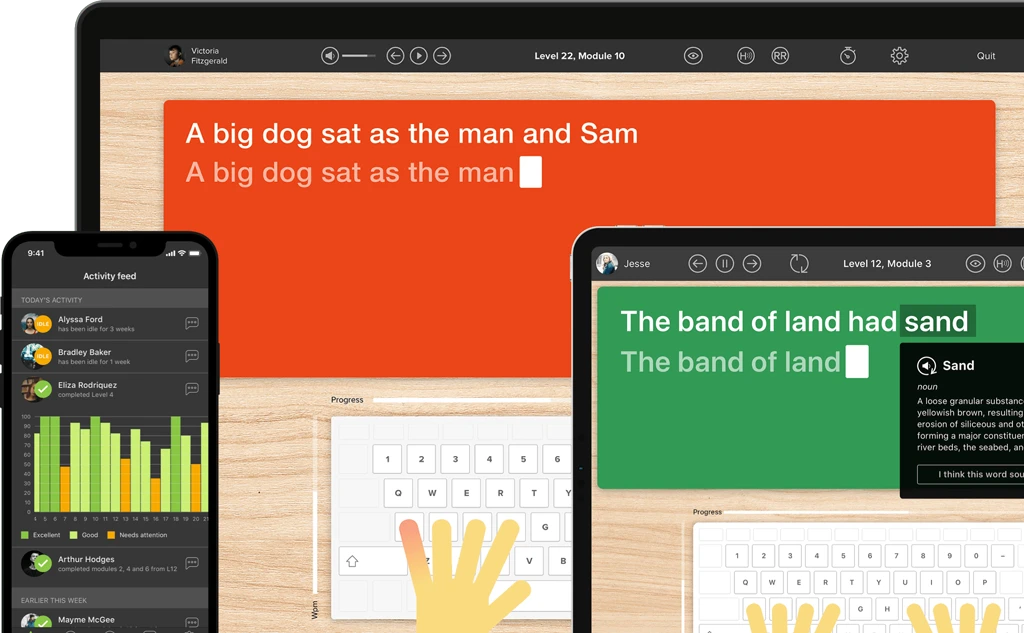
How does TTRS work?
Developed in line with language and education research
Teaches typing using a multi-sensory approach
The course is modular in design and easy to navigate
Includes school and personal interest subjects
Positive feedback and positive reinforcement
Reporting features help you monitor usage and progress




